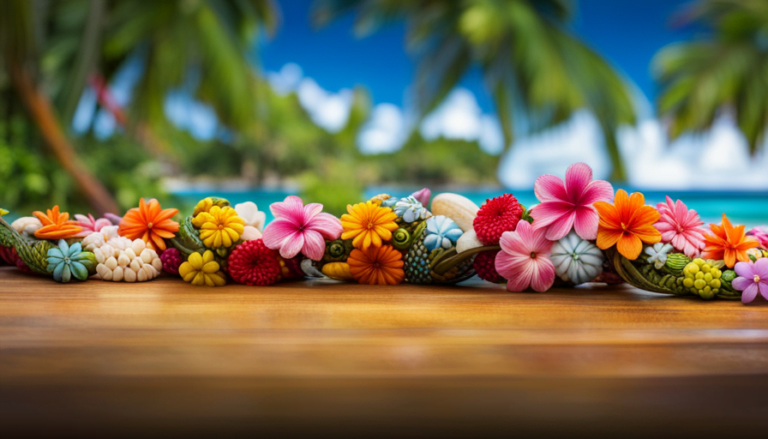Respectful Visitor’s Guide to Oahu 🌺
When it comes to visiting ‘Oahu, there are many things to keep in mind. From the breathtaking landscapes to the vibrant culture, there is no shortage of experiences to be had. But as a visitor, it is important to remember that you are a guest in someone else’s home. This means showing proper respect and etiquette towards the local culture and customs.
On ‘Oahu, etiquette is not just about following a set of rules, but rather about showing respect for the ‘aina, or the land, and the people who call it home. From dressing appropriately to using Hawaiian words and phrases, there are many ways to show your respect for the local culture.
By keeping these customs and traditions in mind, you can make the most of your visit while also showing your appreciation for the island and its people. So, whether you are here for a short vacation or a long-term stay, it is essential to keep these guidelines in mind to ensure that you are being a respectful and mindful visitor to ‘Oahu.
Key Takeaways
- Showing respect and etiquette towards local culture and customs is crucial in Oahu.
- Familiarizing oneself with local customs and traditions is important for cultural sensitivity.
- Dressing appropriately for the environment and activities is a must.
- Respecting local customs and traditions is a way to show appreciation for Oahu’s unique culture.
Show Respect for the ‘Aina
You gotta show respect for the ‘Aina, bruh. Oahu is a beautiful island with pristine beaches, lush forests, and breathtaking landscapes. As visitors or residents, it’s essential to practice sustainability and show gratitude towards the land that provides us with so much.
This means being mindful of our impact on the environment, such as reducing waste and conserving resources. It also means being respectful of the culture and traditions of the Hawaiian people, who have a deep connection to the land and its resources.
One way to show respect for the ‘Aina is by practicing the concept of malama ‘aina, which means to care for and nurture the land. This can be as simple as picking up litter on the beach or using reusable bags and water bottles. It also means respecting the natural environment by not disturbing wildlife or damaging ecosystems.
By practicing sustainability and showing gratitude towards the land, we can help preserve it for future generations to enjoy.
As you explore Oahu, remember to dress appropriately for the environment and activities you’ll be participating in. The island’s climate can vary greatly, so be sure to wear comfortable and weather-appropriate clothing. From hiking trails to beaches, there are different dress codes and etiquette to follow, so be sure to do your research and be respectful of the local customs.
Dress Appropriately
Like the appropriate attire for a job interview, dressing appropriately for a cultural event on Oahu shows respect and appreciation for the host culture. To ensure that you choose appropriate clothing, it’s important to be respectful of dress codes and cultural norms.
Here are some tips to help you dress appropriately for cultural events on Oahu:
- Avoid wearing beach attire, such as shorts and flip flops, unless specifically stated as acceptable.
- Dress conservatively, avoiding clothing that is too tight or revealing.
- Consider wearing clothing made from natural fibers, such as cotton or linen, which are breathable and comfortable in the island’s warm climate.
- When in doubt, ask the event organizers or locals for guidance on appropriate attire.
By dressing appropriately for cultural events on Oahu, you show respect for the host culture and help preserve its traditions.
In the next section, we’ll discuss another way to show respect for Hawaiian culture: using Hawaiian words and phrases.
Use Hawaiian Words and Phrases
When visiting Hawaii, it’s important to understand and respect the language of the Hawaiian people. Language is a key aspect of their culture, and using Hawaiian words and phrases can show your appreciation for their traditions.
Learning common words and phrases such as ‘aloha’ (hello/goodbye), ‘mahalo’ (thank you), and ‘ohana’ (family) can also help you communicate effectively and connect with the local community.
Importance of Language in Hawaiian Culture
The use of Hawaiian language is crucial in preserving and honoring the culture of Oahu. The power of language in Hawaiian culture can’t be overstated, as it’s a means of transmitting knowledge, history, and values from one generation to another.
Beyond this, understanding cultural nuances in communication is also important to avoid misinterpretation or offense.
To emphasize the importance of language in Hawaiian culture, consider the following points:
- Hawaiian language is the official language of the state of Hawaii, and it’s recognized as one of the official languages of the United States.
- The Hawaiian language is unique and has a complex grammar structure that reflects the cultural values and worldview of the Hawaiian people.
- Using Hawaiian words and phrases shows respect for the culture and history of the Hawaiian people.
- Learning the language is a way to connect with the land, the people, and the culture of Hawaii.
- The use of Hawaiian language in everyday life helps to keep the language and culture alive for future generations.
Now that you understand the importance of language in Hawaiian culture, let’s move on to the next section about common Hawaiian words and phrases to use.
Common Hawaiian Words and Phrases to Use
You’ll love the way the locals light up when you use common Hawaiian words and phrases in your daily life. Learning traditional Hawaiian greetings and farewells like ‘aloha’ (hello/goodbye), ‘mahalo’ (thank you), and ‘ohana’ (family) will not only show respect for the Hawaiian culture, but also help you connect with the people here.
Using the Hawaiian language in your conversations is a great way to immerse yourself in the local culture and show your appreciation for the traditions and customs that make Hawaii such a unique place.
As you continue to explore the island, it’s important to keep in mind the proper etiquette when it comes to interacting with locals. While using common Hawaiian words and phrases is a great start, it’s also important to follow proper table manners when dining out.
Remember to be respectful, courteous, and mindful of those around you. By embracing the local culture and customs, you’ll quickly become a welcomed member of the Hawaiian community.
Follow Proper Table Manners
Don’t be afraid to use utensils, it’s perfectly fine to switch between them while enjoying your meal at a table on Oahu. In fact, it’s expected that you practice utensil handling and use proper table manners. Here are a few things to keep in mind:
- Use your utensils from the outside in. That means starting with the fork on the left and the knife on the right.
- When you’re not using your utensils, place them on your plate. Never leave them on the table or cross them over your plate.
- Use your napkin to dab your mouth, not wipe it. And always place your napkin on your lap when you sit down to eat.
- Wait until everyone at the table has been served before starting to eat. And remember, it’s polite to take small bites and chew with your mouth closed.
Respect local customs and traditions by following these simple guidelines. By doing so, you’ll show that you’re knowledgeable and respectful of the local culture.
Respect Local Customs and Traditions
Immerse yourself in the local culture of Hawaii by respecting their customs and traditions. Learning about local customs and traditions in Oahu is essential to practicing cultural sensitivity while visiting the island. Oahu is a place with a rich history and diverse culture, and it’s important to show respect to the people who call it home.
One way to show respect is by familiarizing yourself with local customs and traditions. Below is a table of a few customs and traditions that you may encounter while visiting Oahu. Take time to understand them and follow them to show your respect. Remember, respecting local customs and traditions is not only polite, but it also enhances your overall experience while visiting Oahu.
| Custom/Tradition | Meaning | How to practice |
|---|---|---|
| Aloha Spirit | The Hawaiian way of love, compassion, and kindness | Greet people with a smile and use “aloha”as a form of greeting |
| Removing shoes | A sign of respect when entering someone’s home | Remove your shoes before entering someone’s home or a temple |
| Lei giving | A symbol of affection, love, and welcome | Give lei as a gift or wear them as a sign of respect and welcome |
| No honking | Honking is considered rude and unnecessary | Avoid honking your horn unnecessarily, unless it’s an emergency |
By practicing cultural sensitivity and respecting local customs and traditions, you’ll demonstrate your appreciation for Oahu’s unique culture. Being mindful of these practices will not only show respect to the local people, but it will also enhance your overall experience while visiting the island. As you continue your journey, be mindful of noise levels and how they may affect those around you.
Be Mindful of Noise Levels
When visiting Hawaii, it’s important to be mindful of the local customs and traditions. One such custom is the importance of peace and quiet in Hawaiian culture. Loud noises can be disruptive and disrespectful to the community.
To be respectful of noise levels in public spaces, it’s important to be aware of your surroundings and keep your voice and music at a reasonable volume. Remember to be considerate of those around you and their need for a peaceful environment.
Importance of Peace and Quiet in Hawaiian Culture
One of the most cherished values in Hawaiian culture is the importance of maintaining peace and quiet. Mindfulness in public spaces isn’t just about being considerate of others, but also reflects the cultural significance of stillness.
In Hawaiian tradition, silence is often equated with wisdom and reverence. This is why it’s important to be mindful of noise levels when in public spaces.
To embrace the importance of peace and quiet in Hawaiian culture, here are some tips to keep in mind. Firstly, try to keep your voice down when engaging in conversations in public areas. Secondly, avoid using your phone or other electronic devices in public spaces, especially if they emit loud noises. Lastly, when participating in outdoor activities, be mindful of the impact your noise may have on the environment and wildlife.
By following these tips, you can show respect for Hawaiian culture and contribute to a more peaceful and harmonious community.
Tips for Being Respectful of Noise Levels in Public Spaces
To be respectful of noise levels in public spaces, you should try to keep your voice down when talking, especially when using public transportation or engaging in outdoor activities. Loud conversations can be disruptive to others and can also disturb the natural environment and wildlife. If you need to speak with someone, try to find a quieter location or use a lower volume.
Another way to show respect for noise levels in public spaces is to avoid using loud electronic devices. If you need to use your phone or music player, use headphones instead of playing the sound out loud. This will help to keep the noise level down and prevent disturbing others around you.
Remember, being mindful of the impact your noise may have on those around you is an important part of being a respectful member of the community.
Frequently Asked Questions
Is it appropriate to wear swimwear outside of the beach or pool areas?
It is generally not appropriate to wear swimwear outside of designated beach or pool areas, as it is not considered fashionable or culturally sensitive. It’s important to be mindful of local customs and dress appropriately in public spaces.
Are there any specific Hawaiian words or phrases that are considered offensive if used incorrectly?
Watch your tongue and mind your manners when using Hawaiian words. Common Hawaiian slurs are considered offensive and improper usage of Hawaiian names can be disrespectful. Learn proper pronunciation and usage to show respect for the culture.
Should I bring a gift when visiting a local’s home?
When visiting a local’s home, it is customary to bring a small gift such as flowers or a food item. This is a sign of respect and appreciation for their hospitality and cultural norms.
Are there any specific hand gestures or body language that should be avoided?
Oh, definitely not. You should just go ahead and use any hand gestures or body language you please. Who cares about cultural sensitivity towards non verbal communication? It’s not like you’re visiting a different culture or anything.
How should I handle tipping in restaurants or other service industries in Oahu?
When dining out or using services in Oahu, it is customary to tip between 15-20% of the total bill. Be aware of cultural differences in service expectations. Show appreciation for good service with a respectful and timely tip.







